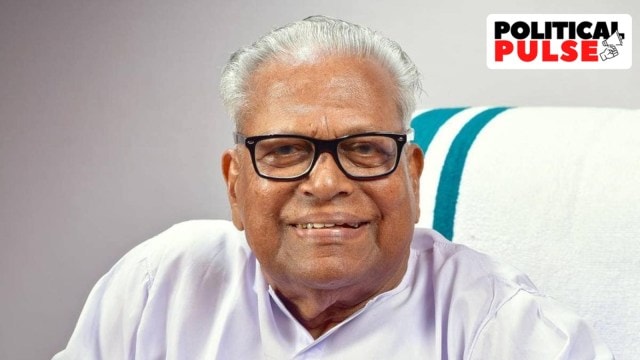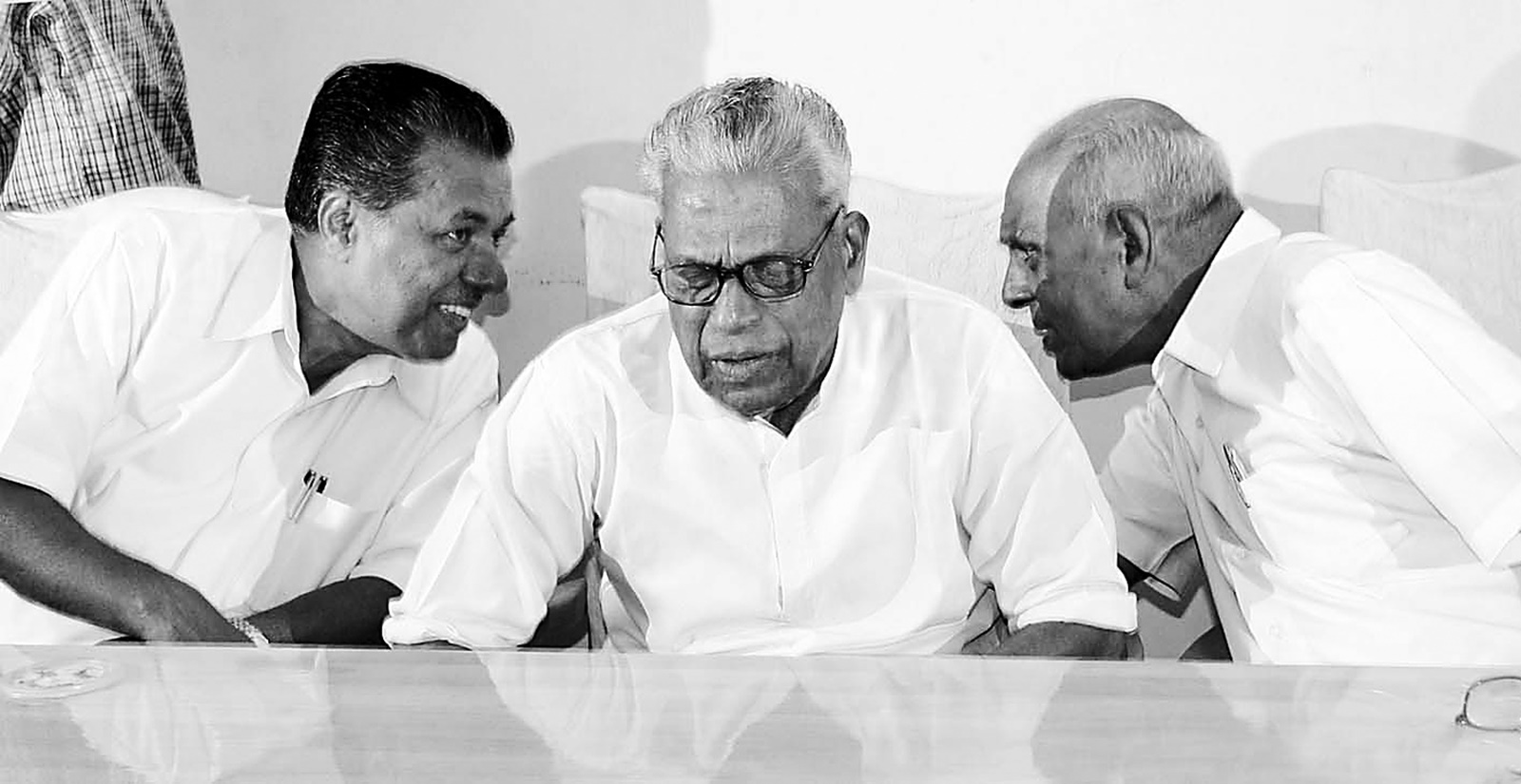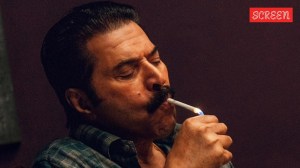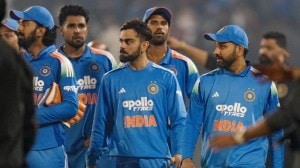100 not out: Comrade V S Achuthanandan’s long march
“A happy day for all progressive movements.” That's Kerala CM Pinarayi Vijayan on his indefatigable rival's birthday, showing just why VS is still the grand old man of state's politics
 Velikkakathu Sankaran Achuthanandan, or VS as he is fondly known in the state, turns 100 on October 20, 2023. (Facebook/PinarayiVijayan)
Velikkakathu Sankaran Achuthanandan, or VS as he is fondly known in the state, turns 100 on October 20, 2023. (Facebook/PinarayiVijayan) HE IS Kerala’s crimson sun, one of the brightest stars in its socio-political space for decades, shining long past his career entered the twilight years. On Friday, Velikkakathu Sankaran Achuthanandan, or VS as he is fondly known in the state, turns 100.
It has been five years since the legendary Communist and former chief minister retreated from active public life after a stroke. But in public imagination, he remains the fighting fit nonagenarian, who kept both his party CPI(M) and the rival Congress on their toes at his peak, both as CM from 2006 to 2011, and as Leader of the Opposition in 1991-1996, 2001-2006 and 2011-2016.
In the 2016 Assembly elections, when VS was 93, the LDF picked him as the face of its campaign to wrest power from the Congress – and won. After the polls, though, the CPI(M) retired VS, who was by all accounts raring to go on, euphemistically dubbing him the “Fidel Castro of Kerala” – in a reference to the legendary Cuban leader who reigned supreme till he was similarly phased out.
From 2016 to 2021, VS held the largely honorary post of chairman of the State Administrative Reforms Commission, even as the CPI(M) control passed on to his arch rival Pinarayi Vijayan.
However, in Kerala, few believe they will ever have another VS.
 V S Achuthanandan (centre) with Pinarayi Vijayan (left). (Express Archives)
V S Achuthanandan (centre) with Pinarayi Vijayan (left). (Express Archives)
The one and only
Born in 1923 in Punnapra village of Alappuzha district to the backward Ezhava community, VS lost both his parents by the age of 11. Just 4 when his mother died, he said he had haunting memories of her death from smallpox. The disease did not have any treatment then, and VS recalled her watching him longingly from a hut where she was kept in isolation.
By 12, he had dropped out of school to make ends meet, and started working at his elder brother’s tailoring shop.
Like many early Communist leaders, the Congress was VS’s launching pad, and he joined it at the age of 15. Two years later, he switched to the CPI, and made his mark working among fishermen, toddy-tappers and coconut climbers of Alappuzha.
In early 1940s, after he joined a coir factory at Alappuzha, he came in touch with legendary comrade P Krishna Pillai.
Recalling those early years, VS said: “I would stay in a house at Cherukara for party work, located in a paddy field with streams. I would walk kilometres along narrow ridges to reach workers.’’
It was during these days that VS mastered his halting and winding oratory – to reach out to an audience spread out over fields, without a public address system – later to be emulated by countless mimicry artists.
VS gradually climbed up the CPI ranks, from Alappuzha district secretary, to member of the state committee, and then member of the state secretariat in 1957. That year, the CPI formed the first non-Congress government in India.
 V S Achuthanandan, Pinarayi Vijayan and other leaders at a Central Committee meeting in New Delhi in 2009. (Express Archive)
V S Achuthanandan, Pinarayi Vijayan and other leaders at a Central Committee meeting in New Delhi in 2009. (Express Archive)
In 1964, VS was one of the 32 party leaders who walked out of the CPI to float the CPI(M). He is one of only two founders of the CPI(M) now alive, the other being 102-year-old N Sankaraiah, from Tamil Nadu.
A year after the CPI(M) was formed, VS contested his first election from the Ambalapuzha Assembly seat, but lost. He went on to win the seat in 1967 and 1970. In 1980, by which time the era of coalition politics had begun, VS was elected as state secretary of the party; a post he held for 12 years until 1992.
It was during this innings that he showed his inflexible political side. In 1986, VS’s hand was seen in the ouster of powerful leader M V Raghavan, over an overture to get the Muslim League to the LDF. In 1994, he was instrumental in scuttling the chances of firebrand Communist and fellow Ezhava and Alappuzha leader K R Gouri Amma of becoming CM.
As the LDF convener in 1996, VS faced public ire for leading an agitation against replacement of paddy with other crops. Scores of farmers suffered losses as their cash crops were destroyed as part of this.
After the LDF won in 1996, VS hoped to become the CM. However, his own shock defeat from party stronghold Mararikulam put paid to that. Still, he had his way, preventing Susheela Gopalan, the wife of CPI(M) legend A K Gopalan, from becoming CM.
VS was seen as a bitter man, lashing out over the 1996 defeat as well as two consecutive losses for the post of party state secretary in 1992 and 1995. However, his clout remained undimmed, and in 1998 in a party state conference, he virtually decimated a rival group in CITU, the party trade union wing.
The rivalry
Several leaders who struggled to grow under VS’s shadow veered towards Pinarayi Vijayan, also an Ezhava leader, who slowly carved out a powerful Kannur lobby, named after his home district.
In the years that followed, CPI(M) politics would be marked by the VS vs Vijayan feud, which played out in public and weaved threads of personal animosity with ideological differences. As VS stuck to his image of a copybook Communist, Vijayan evolved as a moderator, open to change.
Between 2001 and 2006, when he was the Leader of the Opposition again, VS embraced change too, with the diehard Communist now evolving into a mass leader. His vehicle was corruption, with VS pitting himself as a “crusader” against the ruling Congress’s “misdeeds”.
The Congress and the CPI(M) are opposed to each other in Kerala and other parts of the country and have been traditional rivals in the elections in Kerala
But that does not come in the way of my warmly felicitating Shri V S Achuthanandan, former Chief Minister of Kerala, on his…
— P. Chidambaram (@PChidambaram_IN) October 20, 2023
A series of sex scandals around this time, allegedly involving senior politicians, incidents of encroachment on forest land, and growth of an assortment of mafia, created public despair that helped build a virtual VS cult. He was indefatigable, taking up every such issue, touring across the state, visiting protest sites. “Those engaged in sex trafficking and molesting minors should be handcuffed and paraded along streets,’’ was his refrain.
However, in this zeal, VS took his eyes off the party, which slowly slipped under the grip of Vijayan. In 2002, Vijayan became a member of the CPI(M) Politburo.
When he realised Vijayan was stealing the race, VS made a last bid to take him on, accusing the party of taking external funding and “hobnobbing with capitalists”.
The one-time CM
With VS rebelling against own party, the CPI(M) did not want to field him for the 2006 Assembly elections. It finally gave in after wary cadres held protests against denial of seat to the redoubtable crowd puller. The LDF’s victory finally fulfilled VS’s ambition to become CM.
The 87-year-old’s tenure, though, was rocky, with his Cabinet members openly aligned to Vijayan. VS, for his part, blocked attempts by party leaders to bring changes. Several industrial projects, backed by Vijayan as the party secretary, were put off.
At the peak of the factional fight, in 2007, VS and Vijayan were both suspended from the Politburo for a few months. Again, in 2009, VS was removed from the Politburo after he took a stand against Vijayan in the SNC Lavalin corruption case.
However, warnings to mend his ways fell on deaf ears.
Perhaps, he felt little need to. For, his enduring popular appeal ensured that the LDF went into the 2011 Assembly elections with VS as the face. Amazingly, he almost swung the polls for the Left, reducing the Congress-led UDF to only 72 seats in the 140-strong Assembly. VS tried, but failed to convince the LDF to try retaining power.
Four years later, at 92, VS walked out of a state party conference over comments critical of him. Even in 2017, the party had to step in to ask the grand old man to “comply with party discipline.
As he turns 100, VS’s son V A Arun Kumar says the nonagenarian retains his spark and keeps track of political developments. There have been many calls to wish VS, Kumar adds. “He is not meeting visitors to avoid chances of infection… When Governor Arif Mohammed Khan called, he just conveyed his thanks.”
Vijayan too sent his regards: “Comrade VS played a crucial role in the making of Kerala to the present stature. He travelled along with the modern history of Kerala. He always stood for the working-class people, fighting against exploitation. When he turns 100 today, it is a day of pride and happiness not only for the party, but for all progressive movements.”
- 01
- 02
- 03
- 04
- 05































